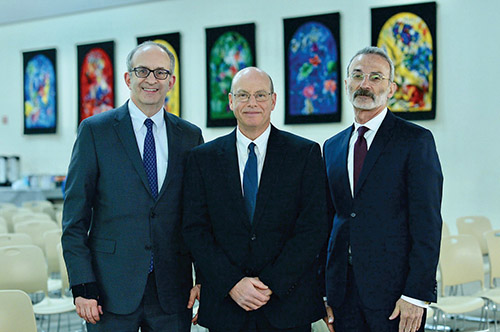
(Courtesy of Touro) If your child received a prescription for Percocet after getting wisdom teeth removed, he is not alone. He is also at risk of opioid addiction. Just one week’s worth of this commonly prescribed painkiller can cause addiction. The extremely addictive nature of opioids is driving a national epidemic, and making them the leading cause of death for Americans under 50.
Touro College and University System recently hosted a program to educate the Jewish community on the causes of addiction and discuss ways communities can help their members recover. “It is time to recognize that addiction affects every community, and that we all can play a role is breaking its hold on our friends and families,” said Alan Kadish, MD, president of Touro College and University System
Dr. Richard Riemer, DO, told the audience that opioid addiction is a disease, not a personal or moral flaw. Pharmaceutical companies have encouraged doctors to over-rely on opioids to manage pain. As a result they have been over-prescribed, he explained. One in 10 Americans is currently using opioids.
Dr. Riemer is an expert in neurology and a consultant to the Medical Board of California. He is also the senior associate dean of Touro University California College of Osteopathic Medicine. Dr. Riemer’s contributions have informed the development of the California Medical Board Guideline for Prescribing Controlled Substances for Pain.
David Mandel, CEO of OHEL Children’s Home and Family Services and chair of the advisory board for Touro’s Graduate School of Social Work, called upon the Jewish community to eradicate the stigma associated with addiction and reintegrate recovering addicts into their communities and jobs.
“When I was a child, people whispered ‘the C word’ instead of saying ‘cancer.’ Just as we now speak openly about cancer, we must also speak more openly about drug addiction,” Mandel said. He shared six steps a community can take to support recovery
- 1. Don’t stigmatize—Shaming, gossiping or labeling the addict is a shortcut to their relapse.
- 2. Don’t be judgmental—Someone you know or love can be that addict tomorrow.
- 3. Acknowledgment—Addiction happens in the best of families.
- 4. People in glass houses should not throw stones—Who is without fault?
- 5. Prevention—Invest time in your family. One cannot overemphasize the importance of communication with your children and teens. This also means understanding current trends, knowing how to speak with your kids and understanding warning signs.
- 6. Embrace and support the addict in recovery—Provide a job, include in synagogue and social activities. Don’t isolate the addict.
For more information about confronting addiction, contact OHEL at 800-603-OHEL or the JACS program at the Jewish Board of Family and Children’s Services at 212-632-4600.












